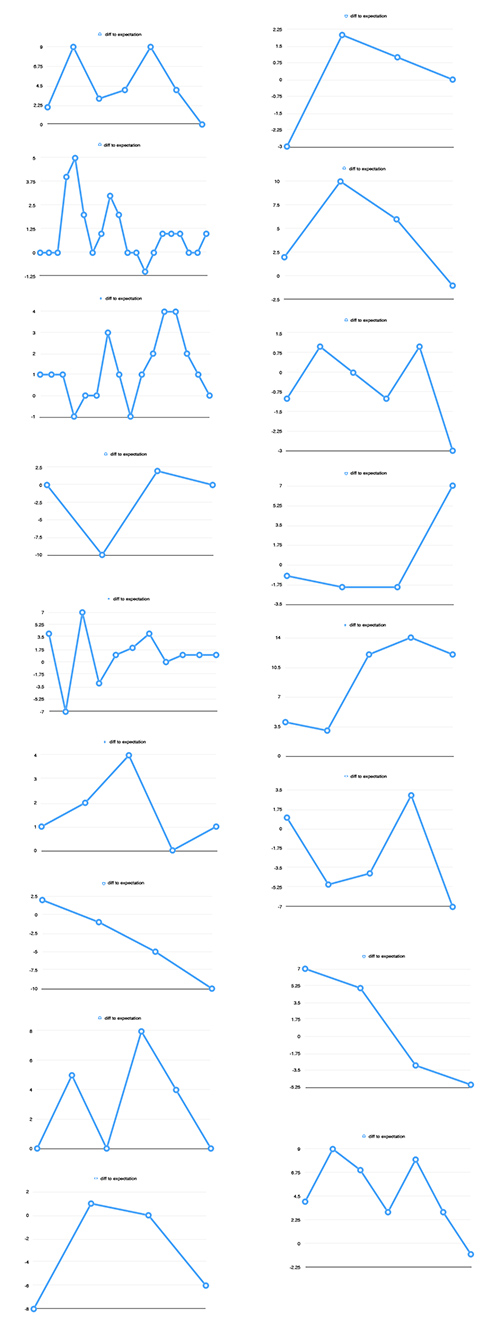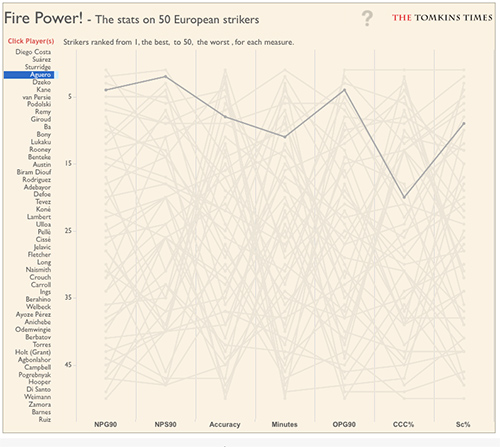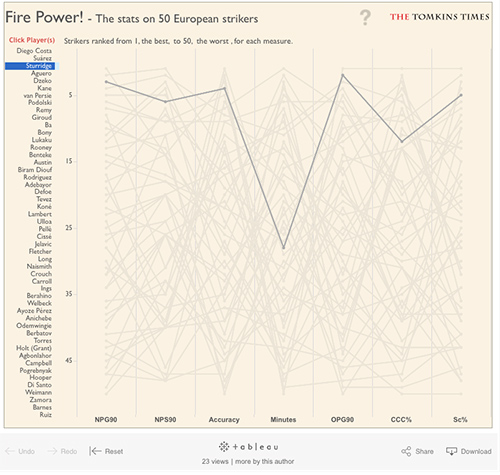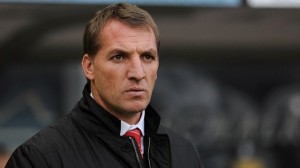By Paul Tomkins.
Having spent the past few days undergoing psychotherapy, hypnotherapy and even the brain-wiping treatment used in The Eternal Sunshine of the Spotless Mind (complete with Kirsten Dunst dancing on my bed), I can still recall a vague sense of something really bad happening on a football pitch on Sunday. The numbers ‘6’ and ‘1’ keep popping into my mind. It’s a mental stain that just can’t be erased, even by the computers of Mark Ruffalo and Tom Wilkinson.
Despite this, I see quite a few (if not all) of the struggles this season as being beyond Brendan Rodgers’ control – or, at the very least, he faced difficult situations where a judgement call could easily go wrong. You can all then decide for yourselves what, in addition to these extenuating circumstances, the manager messed up on, and whether more could have been done (just do so without resorting to hindsight). You are also free to reach your own conclusion about whether Rodgers should stay on as manager or not.
But remember, you can always make criticisms of any manager – not even the best ones are perfect. When things are going well for a manager his qualities will be extolled, and when things are going badly those same qualities, which won’t have changed, will be labelled as flaws.
It’s fair to say that I can’t make a watertight case for Rodgers staying, after the final two performances punctured holes in some of my arguments, but I do think a sense of perspective is called for, now that dust has settled on what I described as a clusterfuck of a campaign. (I’ve calmed down a bit since then, but it’s still been a car crash of a season.)
In many ways it reminded me (as I’m sure it has others) of Rafa Benítez’s final season: sale of pivotal player; a bad start in the league following the high of being runners-up; group stage exit of the Champions League; money spent on an absent high-profile Italian international; and a manager trying to remain positive and bullish, and winding up his detractors in the process (when, if he was negative and defeatist, as Hodgson was, everyone would probably go even more crazy). Plus there was Rodgers’ team finishing 6th with 62 points and Benítez’s team finishing 7th with 63 points.
You sensed things becoming untenable, but mainly as the fan-base sliced itself right down the middle. Rafa had a better record of success behind him (the trophies were earlier in his tenure, but his best team was five years in – and it won nothing), but was at war with cowboy owners and Cuban-heeled execs.
Rodgers has better custodians, but they aren’t rich by some rivals’ standards, and in trying to do the right thing (Director of Football, then a transfer committee) they’ve ended up with what seems like a fudged vision, as they also attempt to stay within the FFP guidelines and find ways to get the best value for money. They’ve been sensible in their approach to the transfer market, rather than reckless, but too many players have failed to settle quickly enough (or at all). I believe that there’s some sound long-term investment in players going on, but the ones old enough to be in their peak now have also struggled, and that’s been problematic. (But even older players can take time to adapt.)
Defending a manager after a mediocre or relatively poor season is not ‘defending mediocrity’ – because obviously those who stick by a manager in such circumstances believe that things will get better. It might not, of course. But then nothing in football comes with any guarantees. And no one said 2013/14 was mediocre, so it’s not like the manager only has mediocre seasons to his name.
Anyway, here are a few things that I think almost any manager would have struggled with:
– The transfer situation – all managers have poor periods of buying, and indeed, Rodgers was not entirely responsible for the transfer activity. When people lump all the blame at his door it seems unfair. He takes some of the blame for the failures (especially if any were driven by him), but unlike most managers, he cannot take all of the blame (or indeed all of the credit for the ones that work out) because he is merely one member of a committee. It’s his job to make these players look good on the pitch, but better managers have failed to do that with better players. (Mourinho and Shevchenko spring to mind.)
– Last season was unsustainably good. There was always likely to be a drop, because everything seemed to go right. This season an unusual amount seemed to go wrong.
– Managers’ fortunes rise and fall pretty rapidly. Too rapidly, in fact. Below is a graphic for the Premier League’s longest-serving managers (Ferguson, Wenger, Moyes, Benítez, Houllier, O’Neill, Keegan, Pulis, Allardyce et al) where at least four seasons were spent in the Premier League at the same club – and shows their season by season performance at that club against expectations (where they should finish based on the resources they had, with those resources obviously changing over time). It’s not meant to be individually analysed: it doesn’t matter if you know who is who – the idea is to get an idea of the dramatic flux in fortunes. (And Ferguson’s massively fluctuating first six seasons are not included.)
(As an aside, earlier in the season Carlo Ancelotti’s Real Madrid won 22 games in a row. Twenty two! A bad run in the new year, and a couple of key defeats at the wrong time, and he ended up trophy-less and out of a job. Similarly, it seemed that Rafa Benítez was going to get sacked by Napoli after a bad run in the new year, until he took his team to two semi-finals, at which point a new deal was mooted by the owner. They then narrowly lost both of those semi-finals, and suddenly he was under pressure. In Germany, Jurgen Klopp’s Dortmund recovered from being bottom of the table in the winter to finish 7th, but still 33 points off top spot. Three great managers, three hugely inconsistent seasons. Add Louis van Gaal, with the biggest spend in the summer and the costliest squad in the league, and yet failed to inspire anyone, and that makes four.)
– The increase in cup games Liverpool ending up facing was always likely to result in negative impact on league, if not quite to the level we saw. My research shows that: on average, playing a lot of cup games harms league form, and, as you’d expect, it harms small and medium-sized squads more than large ones. It also shows that 20 cup games – which Liverpool played – is only suited to a bigger squad; and that a sudden increase in cup games (in this case, a quadrupling) usually results in a bigger loss of league points and a drop in league position. (Research findings to be expanded and made public this summer.)
– Suarez was hard to replace – harder than I anticipated. It was never going to be easy, but you can build a better team by selling your best asset if you get a good price. Liverpool did it with Keegan and Rush, as just two examples. However, a bus-load of mediocre players (if that’s what you end up with – and I’m not saying that’s what Liverpool got) won’t help the first team as much as one genuine world-class star. But it’s never just about the short-term, as we saw with Henderson and various others before him, when looking mediocre for a season. Liverpool’s new signings, Can aside, had mediocre campaigns, but that doesn’t make them mediocre players. The issue is, are Can, Markovic, Moreno and Lallana (plus Origi when he arrives) going to be important players over the course of their Liverpool careers? I believe they can be, but as with any signing, you can never say anything for certain.
– Statistically, Daniel Sturridge is as good as Sergio Aguero in pretty much everything bar minutes played. And losing Sturridge for so long was a bodyblow. See the comparison below, or click on the link to look at the performance of 50 Premier League strikers over the past three seasons (data collated by Dan Kennett from published Opta sources, and converted to Tableau by Robert Radburn. Note: title to interactive graphic should be 50 Premier League strikers).
– Sturridge was always likely to miss a third of the season with injuries, but he barely played a third of the season. Andrew Beasley posted this on TTT yesterday: (We took over 2 points per game from the 12 games Sturridge featured in … Those 25 points were in mostly tough games too – only one game against a team who finished below 12th in the table, and an average opponent placing of 7th. A third of his games were against the top four.) And let’s not forget, he was barely match-fit for any of those games.
– The decline and impending departure of a bona fide legend. I felt that Gerrard’s heart just wasn’t quite in it anymore – and by it, I could just as easily be referring to his belief in himself – with the way everything crumbled for him between April and July last year. (Which is why, for me, it was so nice to see him looking happy in Dubai as Liverpool danced and sang in a tight defensive formation.) The decision to quit, which had been rumoured since the Real Madrid away game, became a distraction, certainly later on in the season as the end drew near. Along with Sturridge, he was still probably the best finisher at the club, but there wasn’t an ideal position for him to play as he approached 35, and Liverpool’s form with him in the side was woeful, compared to the good form when he was absent. “With and without” stats can be misleading, but the difference is so enormous that you have to wonder if it has some significance.
(A guy named Jonathan Alpert sent me the following comments via email: “Gerrard started 25 Premier League games. Of those we won just 8, drew 8 and lost 9 with an average points per game of just 1.32 and a win ratio of just 32%. We scored 32 goals and conceded 38 with a goal difference of -6. Of the 13 Premier League games where he did not start we won 9, drew 1 and lost 3. Our points per game average was 2.15 and our win ratio was 69%. We scored 20 goals, conceded 10, for a +10 goal difference. Extrapolated over a season, without Gerrard we could have achieved 82 points, enough for 2nd place. With him for all 38 games, we would have achieved 50 points, which would bring us in 10th.”)
– Sterling’s contract issues and his crash in form. There was something shocking about a 20-year-old ‘playing’ the media in a demand to leave Liverpool. While he’s allowed to be ambitious, you got a sense when Luis Suarez pulled the same trick two years ago that he had ‘paid his dues’, and was at an age – and what seemed a peak of performance (although, of course, he got better) – to at least try that stunt. Suarez wanting out was a big blow, but understandable; Sterling wanting out just felt a bit insulting. He was playing very well until he went on the BBC without the club’s permission. The whole saga became one more unnecessary sideshow.
– The refereeing. We always feel our team is harshly done by, but last season there seemed to be a fair few beneficial decisions – or, at least, fair ones – whereas this season I lost count of the number of appalling refereeing displays. Sterling, in particular, got very little from referees, and even at the weekend the referee waved away three blatant penalties, with it now apparently okay to trip Lallana in the box too.
– Coping with injuries and suspensions. People over-fixate on issues like playing people out of position in times of need. Everyone seemed fed up with Glen Johnson’s deterioration, and yet also went mad when Emre Can played at right-back. Well, who else was there? Jon Flanagan has been injured all season. That just left Javier Manquillo – who started the season brightly but faded (he looks a good defensive full-back, but very raw). It’s hardly like the manager was leaving out the equivalent of Paolo Maldini. For me, there is no such thing as a ‘correct’ position. They’re footballers. They have a ‘best’ position at given points of their career, but does Guardiola play Lahm at full-back? No. What about Mascherano at full-back under Rafa (the little man was outstanding) and at centre-back at Barca? (Unlikely, we’d have thought given his height, but brilliant.) Managers have to get the best group of players onto the pitch in the strongest mix they can find. Sometimes that might mean players in their best position, sometimes not. As long as you don’t play a midget in goal or a goalkeeper up front, you’re basically asking footballers to work within their overall abilities.
– The team was/is too young. I’ve covered the catch-22 of this before. Established world-class stars like Falcao and Di Maria were out of Liverpool’s price range and wage structure (which had to be kept within FFP limits), and the sensible idea is to find these types before they’ve hit peak value, not after they’ve past it. But then potentially great players may never become as good as Falcao and Di Maria … not that Falcao and Di Maria, at 28 and 26, turned out to be as good as Falcao and Di Maria, and were arguably little better than Balotelli and Markovic this season. However, Liverpool do lack experience overall, and very young teams rarely flourish. The key is to keep them together so that they develop together, but that’s never easy, either.
– People talk about buying “ready-made stars” but they flop far more often than people realise (which I’ve proved on several occasions – only six of the eleven costliest Premier League signings, after inflation, succeeded). FSG have the right basic strategy, but so far either the wrong individuals have been signed, or they haven’t yet had a second season, which is often when ‘duds’ become successful signings (or fall totally out of the picture). The problem this season hasn’t been youngsters like Can and Markovic but those new players aged 24-32.
– Having said that … Balotelli. Just, Balotelli.
Conclusion
Rodgers cannot be responsible for this season’s failings and yet also be lucky for last season’s incredible number of wins. Either you believe in the effect of a manager or you don’t. You can’t choose one of the seasons and ignore the other. However, Luis Suarez obviously played a key role last season – it wouldn’t have happened without him – and Rodgers made mistakes this season. Rodgers had some luck last season, and he lacked some luck this season.
That said, Suarez heavily credits Rodgers for helping him to improve, and it’s not like he’s saying it because the man is still his manager. There’s no pressure on him to say anything at all about Liverpool, now he’s at Barcelona. Suarez’s form improved season-upon-season under Rodgers, although he was a great natural talent; and obviously Rodgers has to shoulder some of the blame over the failure to replace him, but not all of it. If Rodgers helped Suarez to be more effective – and the player thinks he did – then the manager gets credit.
People talk about Rodgers’ tactics, and obviously there are concerns there. But equally the work done with Suarez last season, regarding how to time his runs, and the different positions to pick up, is all tactical. Liverpool broke a clean sheet record under Rodgers this season, but defending as a unit whilst being able to attack effectively is a hard balance to strike – and that would be an area for improvement overall.
In fairness to Rodgers, who wasn’t behind Suarez’s departure, he gave Balotelli a fairly decent run of games, but if the player wasn’t training well, or doing what was asked of him in games – as well as not scoring goals – then the manager has a right to leave him out (even if at times the Italian seemed a little harshly treated from the outside).
To me, neither last season nor this can be ignored. So you mix them together for an overall performance level. And if you do that, it doesn’t make his job seem nailed-on (as it did 12 months ago), but it doesn’t have to result in a sacking. You can of course include his first season, for the full picture, but you also allow some leeway to a manager in his first campaign. (Just not to Roy Hodgson, given how terribly it was going throughout his entire brief tenure.)
You can argue that another manager may have done things better, and that’s true – although it’s easy to invent alternate realities where everything goes right. You will always get mistakes in the transfer market, and you will always drop ‘silly’ points, because that’s how things work. (That said, Liverpool should not be shipping nine goals in two games against Palace and Stoke.)
Rodgers could perhaps have left Gerrard out more often this season, given the far better results without him, but that could have created its own issues and tensions. Next season we’ll get to see what Liverpool are like without Gerrard’s decline being an issue. Liverpool will miss the Gerrard of 1998-2014, but I’m not sure they’ll miss the 2015 vintage.
On transfers, if Rodgers was the driving force behind the signings of Lambert, Lovren and Lallana – as some people suggest – then he has to take the blame for those not working out. While I’m not Lallana’s biggest fan, there’s definitely a good footballer in there – it’s just a case of whether his excellent footwork amounts to as much as it should for the fee and his age (as he’s not a kid). I expect him to be better next season. Lovren is also a better defender than we’ve seen this season, but his utterly astonishing inability to play 90 minutes without making at least one horrendous error undid any good periods he’d have in matches, when it looked like he could be a commanding centre-back. Lambert was a decent gamble at £4m (as 3rd or 4th choice and a potential Plan B) but his legs just weren’t there, and he looked too nervous in his early games to stake a claim for a regular spot.
On the corrosive Sterling issue it’s hard to see what more Rodgers could have done.
On the issue of playing too many cup games, people will always moan if managers don’t take competitions ‘seriously’ enough. Obviously the Champions League is the elite level, where you want to succeed at all costs, but as in Rodgers’ first season, I’m not sure there was enough rotation, especially in the League Cup. But I also appreciate the pressure a manager can be under to win trophies and, in difficult times, simply to win any game they face. And I don’t know have the scientific data on squad fitness issues, and have no way of knowing whether or not training is suited to the requirements.
On referees, Rodgers could have been more like other managers and drawn attention to their incompetence. A few years ago Howard Webb spoke of being generally intimidated by Alex Ferguson, and Jose Mourinho is always looking to put pressure on officials. Ideally the Premier League would fully crack down such behaviour, but while they don’t it seems that, as ever, Liverpool are too nice about these things, both on the pitch and off it. Until you get points (and not just a Europa League spot) for fair play it seems that the Reds are harming their chances in comparison with others.
Overall, I certainly wouldn’t be making a case for Rodgers to stay based on this one season, and the Stoke game remains the stuff of nightmares. But his body of work at Liverpool is still good, with an excellent second half to his first season, and the amazing thrills of his second (lest the revisionists forget), and a period in his third where the team had a strong identity.
His overall record obviously isn’t brilliant, and that leads to understandable fan daydreams about people like Ancelotti and Klopp. Even if you subjectively level out Rodgers’ overall record to be what you describe ‘average’, it contains highs and lows, and not just a constant humdrum predictability. The lack of consistency is a concern, but each season has produced periods when things at least briefly looked exciting, and 2013/14 was way better than anyone was expecting.
Only time will tell if this was just the kind of season-long dip that pretty much all managers experience, or if Rodgers has passed his sell-by date with for the job in hand. If he goes he goes, but let’s try and be fair in our assessments.



